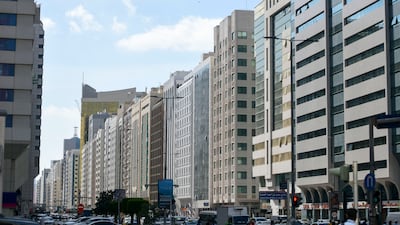Abu Dhabi has launched the emirate’s first residential rental index, aimed at providing indicative rental values for both tenants and landlords across different areas of the capital.
The Rental Index is available online at the Abu Dhabi Real Estate Centre’s website www.adrec.gov.ae, and highlights rents in different areas, it said on Tuesday.
“The platform offers easily accessible and reliable data on residential properties that will help both local residents and those living abroad to better understand the rental market, enabling them to make informed decisions based on reliable data,” Adrec said.
The new announcement comes as rents continue to rise in Abu Dhabi. Apartment rents increased by 2 per cent annually in Abu Dhabi during the second quarter, while villa rents jumped 5 per cent, according to the latest report from Asteco.
Sales prices also saw an increase, with apartment prices rising by 5 per cent year-on-year and villa prices by 3 per cent.
“The Rental Index will energise the rental market in Abu Dhabi and further contribute to the emirate’s competitive edge to attract international investors,” said Rashed Al Omaira, acting director general of Adrec.
Matthew Green, head of research at CBRE Mena, said the new rental index “brought a certain degree of transparency to the real estate market, which is obviously very important when you are an investor or an occupier”.
“If you are an investor, this is a good resource for you to be able to get a bit of a view as to what your likely rental income could be for an asset before you purchase it,” Mr Green told The National.
The rental index also provides “clarity for tenants” while renting an apartment or villa, he added.
“I can look up and I can see what the average rents are for studios or for one bed, two beds and three beds. It helps you as a tenant, helps you kind of forward plan, helps understand what your costs are going to be,” Mr Green said.
Abu Dhabi’s average apartment rents increased by 6.6 per cent in the second quarter compared to a year earlier and average villa rents grew by 2.5 per cent, according to a separate report by CBRE.
As of the second quarter, average annual apartment and villa rents in Abu Dhabi stood at Dh66,375 and Dh166,261, respectively.
Rents and sale prices are recording a “reasonable growth” in Abu Dhabi as the non-oil economy expands, Mr Green said.
“Post Covid, the recovery in the rental market in Abu Dhabi was slower, much slower, probably than we saw in Dubai,” he said.
However, for the past 12 to 18 months, demand for property rose in the emirate as the population increased and the non-oil economy expanded amid diversification efforts.
“We have good growth in the non-oil employment and that’s kind of has a positive impact on the residential market as well,” Mr Green said.
Abu Dhabi’s population rose to just under 3.8 million last year, a sharp increase of 83 per cent since 2011, according to the latest data from Statistics Centre-Abu Dhabi.
The emirate’s non-oil economy also expanded 9.1 per cent year-on-year in 2023, driven by “significant strides” in the construction, finance and insurance, and transportation and storage economic activities, Abu Dhabi Media Office said in April, citing Scad data.
Abu Dhabi’s overall economy grew 3.1 per cent annually during the period, hitting its highest level in a decade amid the expansion of the non-oil sector.
Dubai’s Real Estate Regulatory Authority also recently updated its rent calculator. The Rera calculator, which was recalibrated on March 1 to become more representative of open-market pricing, is revised periodically for certain communities and buildings to reflect current market rental rates.

